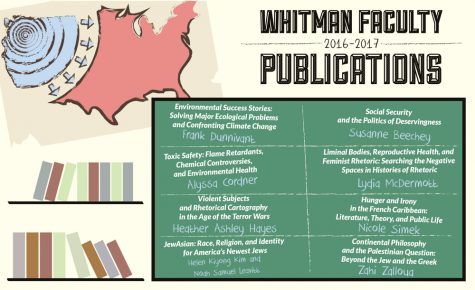Attention is turned to the Board of Trustees this week as the group convenes for its annual Spring overseers meeting. We looked into the educational backgrounds of the board and found that it is dramatically skewed towards the social sciences in general, and economics in particular.
Of the 16 trustees on Whitman’s board, all but two majored in the social sciences during their undergraduate studies. However, campus leadership dismissed the notion that the disproportionately of undergraduate majors among the trustees has any real-world significance.
New trustees are recruited by the board’s governance committee, which evaluates and recruits individuals to be elected by the whole board.
Chairman of the Board Brad McMurchie, who studied history at Whitman, said the sensibilities of individual board members couldn’t be understood or defined in terms of their undergraduate major.
“Trustees have an extraordinary wealth of personal and professional experiences that they bring to their service at the college,” he wrote in an email to The Wire. “In the grand scheme of things, I think their undergraduate majors are not terribly impactful. The best evidence of this is the breadth of the commitments to the academic program made with support of the board over the years–the new art building, the upgraded theater, the addition of three positions in Computer Science, the renovation of Maxey and Olin, etc.”
Topics likely to be discussed at the Trustees’ meetings are wide-ranging. One hot-button issue in particular involves administration’s recommendation to eliminate at least five tenured positions next year, as faculty currently in those positions retire. The recommendation comes as part of an effort to increase the faculty-student ratio, so that funds can be reallocated elsewhere.
Most students would agree that economics and English majors at this school tend to have a distinct interests or priorities. However, both McMurchie and Whitman president Kathy Murray said they didn’t know the majors of most board members until The Wire inquired.
Murray wrote in an email that the board is selected according to “several broad criteria: passion for Whitman and the liberal arts, intellectual ‘horsepower’ and thought leadership, diversity in all dimensions, a track record of accomplishment, willingness to consider Whitman a top personal philanthropic priority, and time and desire to engage at the Trustee level.”
Six of the 18 current trustees majored in economics or finance. The lone trustee who majored in the hard sciences is Stephen E. Hammond, who studied geology and worked in Natural Hazards for the U.S. Geological Survey. The lone trustee in the arts or humanities is William G. Way, who studied art at Whitman, and is the Director and Executive of MCE Social Capital, a nonprofit investment firm that offers loans to “generate economic opportunities,” particularly for women in the developing world.
Whitman Vice President of Development and Alumni Relations John Bogley wrote in an email to The Wire that the school seeks breath when selecting new board members. The board operates as a collective; “Each new member of the board need not be someone who contributes in all areas,” wrote Bogley.
“We seek gender balance,” he continued. “We seek to increase ethnic diversity … We seek candidates who offer philanthropic leadership experience with nonprofits; prominence in their profession, community or region; a commitment to Whitman; time available for service to Whitman; financial understanding/experience in finance; marketing savvy; technical savvy and financial capacity to support the college philanthropically.”
Members of Whitman’s board are involved in modest range of fields–law, consulting, tech, activism, banking, lumber and logistics among them. Akshay Anand Shetty, who studied economics here at Whitman, is the Co-CEO of Combe, which produces Vagisil and Just for Men, among other personal care products.
Murray wrote that, “When we look for Trustees and other leaders for the college, we look for the people most qualified to do the work. Whitman currently has a Provost who is a scholar of English and a President who is a pianist, so some people might worry that we could be too narrowly focused on the humanities and arts, but we both know that our jobs require us to consider the best interests of the entire institution.”



